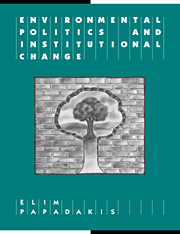Book contents
- Frontmatter
- Contents
- List of Tables and Figures
- Preface and acknowledgements
- Abbreviations
- Part I Introduction
- Part II Political Institutions, Innovation and Social Change
- Part III Political Organisations and Adaptation
- 8 Inertia and innovation
- 9 Missed opportunities: The Liberal and National Parties
- 10 Leading the charge for the green vote: The Australian Labor Party
- 11 Fundamentally green: The Australian Democrats
- 12 Overcoming institutional inertia
- Part IV The Media, Agenda Setting and Public Opinion
- Part V Conclusion
- Appendix: Codes used in tables 9.1 to 12.1
- Notes
- References
- Index
10 - Leading the charge for the green vote: The Australian Labor Party
Published online by Cambridge University Press: 18 December 2009
- Frontmatter
- Contents
- List of Tables and Figures
- Preface and acknowledgements
- Abbreviations
- Part I Introduction
- Part II Political Institutions, Innovation and Social Change
- Part III Political Organisations and Adaptation
- 8 Inertia and innovation
- 9 Missed opportunities: The Liberal and National Parties
- 10 Leading the charge for the green vote: The Australian Labor Party
- 11 Fundamentally green: The Australian Democrats
- 12 Overcoming institutional inertia
- Part IV The Media, Agenda Setting and Public Opinion
- Part V Conclusion
- Appendix: Codes used in tables 9.1 to 12.1
- Notes
- References
- Index
Summary
Background
Founded in 1891, the ALP is the oldest political party in Australia. As noted in chapter 8, there is disagreement over whether or not the ALP still represents a ‘labour tradition’. Yet, tradition and innovation need not be treated as exclusive categories. A significant element of continuity in the ALP is the enduring influence of trade unions. The ALP was created as a political instrument for the trade union movement, and the ties remain close: ‘The ALP was founded by trade unionists and it is still one of a small handful of true “labour parties” in retaining union affiliation and funding at the core of its organisation’ (Jupp 1982: 103).
The 1994 platform retains the connection with the origins of the party by noting ‘The recognition by the trade union movement of the necessity for a political voice to take forward the struggle of the working class against the excesses, injustices and inequalities of capitalism’. This does not settle arguments over continuity and change in the party. Democratic socialism, the term widely used to describe the ideology of the party, is interpreted in different ways by members and factions of the ALP.
The following issues are therefore pertinent to any analysis of the attempts by the ALP to adapt to environmentalism in recent times:
the potential tension between the historic focus by the ALP on the needs of the working class and the attempt by the party to appeal to a broader cross-section of the population;
the increase in support for the ALP among those with tertiary education and in non-manual occupations in the 1970s and 1980s (see Papadakis 1993: 177, table 6.1);
[…]
- Type
- Chapter
- Information
- Environmental Politics and Institutional Change , pp. 95 - 118Publisher: Cambridge University PressPrint publication year: 1996

